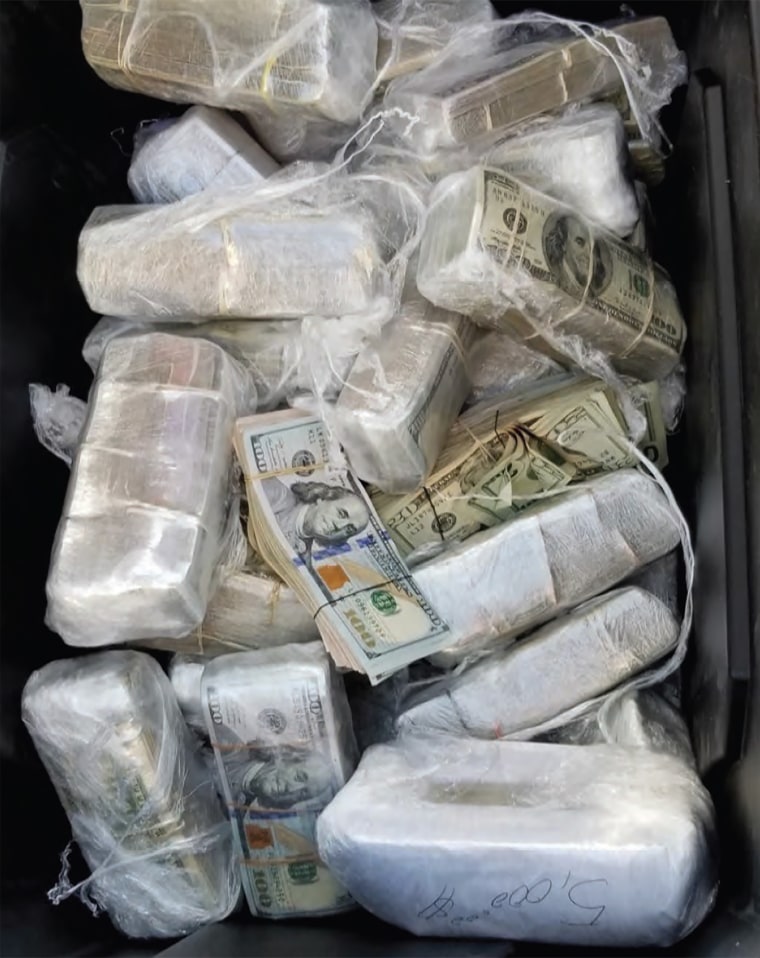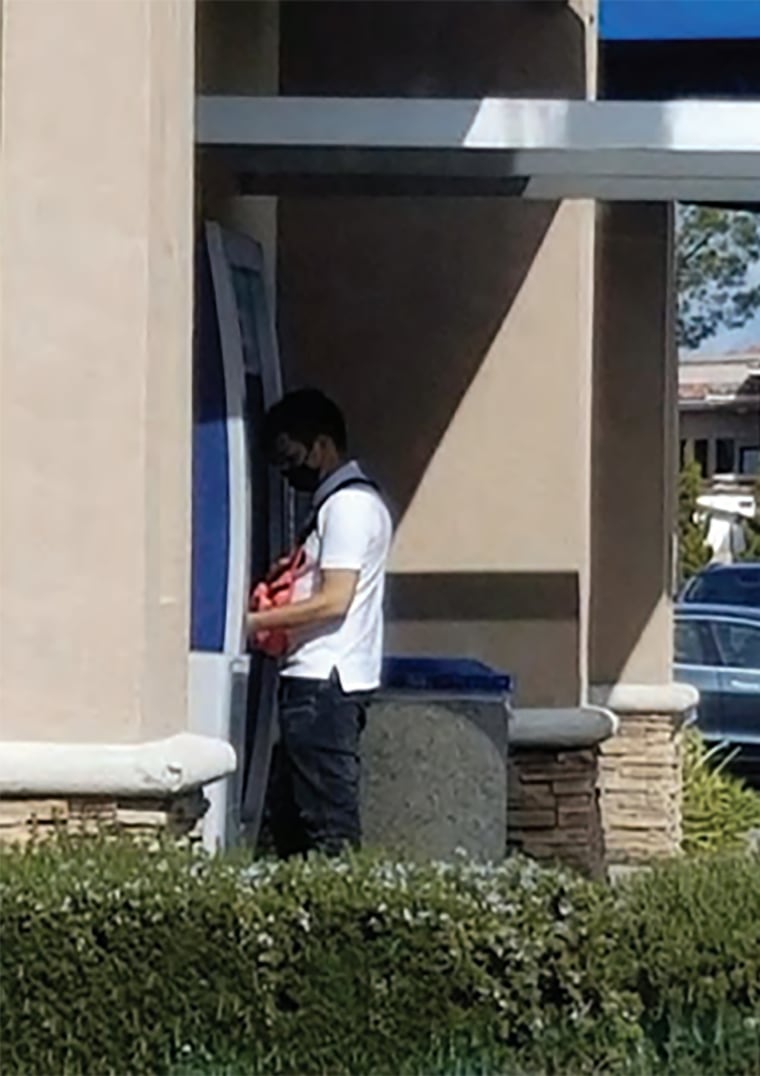For much of his career as a federal drug agent, Ray Donovan had a singular focus: the capture of Mexican cartel boss Joaquin “El Chapo” Guzman. When Guzman was finally arrested in early 2014, fentanyl trafficking was on the rise in the U.S., and Donovan soon found his next project.
He enlisted a data scientist in an effort to map out the fentanyl networks operating on the East Coast. Reviewing the telephone records of suspected traffickers, investigators saw a pattern of activity that shocked them.
“A ton of calls to China,” recalled Michael Mezner, one of the DEA agents leading the effort. “I looked at that data from every way, and I went to the data guy and told him, ‘I don’t know what’s going on here, but I’ve never seen anything like this in my life.’”
It was a new dynamic: Chinese criminal groups were laundering drug money for the Mexican cartels on an unprecedented scale.
In 2015, Donovan had to turn his attention back to El Chapo after the Sinaloa cartel leader escaped from prison. By the time he was recaptured a year later, investigators digging into the fentanyl trade had made another significant discovery.
The same Chinese brokers who were laundering fentanyl proceeds were now heavily involved in marijuana trafficking across the U.S. as well.
“That was an eye-opening moment,” Donovan said.
What Donovan’s team was first to recognize has national security implications, experts say. Over the past decade, Chinese organized crime groups in the U.S. quietly became the dominant money launderers for Mexican cartels. Then they used the profits to take over the illicit marijuana trade.

The parallel schemes enriched and empowered Chinese criminal groups at a time when marijuana laws were loosening and the Mexican cartels were flooding the country with fentanyl. With U.S. law enforcement agencies focused on busting fentanyl traffickers and suppliers, the Chinese money brokers and marijuana producers operated with relative impunity, according to more than a half dozen retired senior DEA agents.
“It’s two revenue streams that no one else can compete with,” said Christopher Urben, a former assistant special agent in charge at the DEA’s Special Operations Division in Virginia. “They’ve created within the United States, I hate to say it, this super cartel organized crime force.”
The Chinese laundering system has exponentially increased the profits of the two Mexican cartels fueling the fentanyl crisis in the U.S. — the Sinaloa and CJNG. The vast amounts of funds involved also raises national security concerns, according to experts and U.S. lawmakers.
Chinese criminal syndicates are known to operate across the globe with the tacit support of the country’s intelligence services. Current and former American officials fear that at least some of the illicit drug proceeds could be used for nefarious purposes in the U.S. — like corporate espionage or election meddling.
Dennis Wilder, a former CIA officer and China expert, said it’s imperative for American authorities to investigate whether some amount of the illicit cash is flowing to China’s powerful spy agency, the Ministry of State Security, which is known to aggressively target the U.S.
“Obviously this has been neglected in the U.S. government,” Wilder said. “It needs attention.”
The Office of the Director of National Intelligence declined to comment. The CIA and National Security Council did not respond to a request for comment.
Urben and the other former DEA agents said they tried for years to marshal government resources to stem the rise of the Chinese money laundering networks in the U.S. and the crucial role they play in propping up the fentanyl trade.
But the U.S. efforts made limited progress, because penetrating the financial networks requires an abundance of time, manpower and political will. With fentanyl deaths spiking during the pandemic, law enforcement focused its attention primarily on the traffickers instead of the underground financial network that keeps the cartels’ operations humming, the former agents said.
“We’ve let this happen,” Urben said.
Since 2023, federal prosecutors have charged at least 31 people linked to Chinese groups accused of laundering cartel drug money. But those cases represent only the tip of the iceberg, the former agents say. Thousands of Chinese money brokers are believed to be operating across the country.
Bill Bodner, the former head of the DEA’s Los Angeles division, said the lack of visibility into these networks is deeply troubling.
“Is there more to the story that most of us don’t know yet?” he said.
Project Sleeping Giant
Chinese criminal groups have quietly operated for decades in the U.S in major cities like San Francisco and New York. They largely stayed under the radar of law enforcement by engaging in non-violent criminal activities such as wildlife trafficking and cybercrime.
The organizations have long maintained a more robust and aggressive presence in Asia and the Pacific — in countries like Australia and Singapore — where their money laundering schemes focused on Chinese entities. But their recent partnerships with Latin American drug trafficking organizations have catapulted them into becoming the dominant money launderers worldwide.
“It’s striking how rapidly that rise has taken place,” said Vanda Felbab-Brown, a senior fellow at the Brookings Institution who studies Chinese organized crime.
In 2018, the DEA’s elite Special Operations Division launched Project Sleeping Giant, an initiative bringing together multiple government agencies to target Chinese-linked drug activity and money laundering.
The DEA had already identified several Chinese money brokers involved in fentanyl sales in New York, Los Angeles, Chicago, and Miami. In the ensuing months, the team began to understand for the first time how the Chinese became the Mexican cartels’ go-to money launderers.
The laundering begins with Mexican cartel associates dropping off cash from fentanyl sales to Chinese money brokers in the U.S. The Chinese money brokers then arrange for the cartels to receive the equivalent amount in pesos or cryptocurrency in Mexico. In some cases, a Chinese associate in Mexico will physically deliver cash in bulk to a cartel stash house.

The Chinese brokers manage to keep a ready supply of cash on hand in Mexico through a system of informal trade. Their associates in China, in regions like Guangzhou, purchase goods such as high-end electronics and ship them to Mexico. They’re then sold by Mexican businesses for cheaper rates to consumers, generating cash that they provide to the cartels.
The system also relies on wealthy Chinese nationals in their home country. In 2016, the government of Chinese President Xi Jinping imposed a $50,000 limit on the amount of money that citizens could move out of the country, creating a demand for U.S. dollars that can be used to pay for things like real estate and tuition in America, where the economy is more stable.
That is where the Chinese money brokers make the majority of their profits.
Using encrypted platforms like WeChat, they sell the U.S. dollars at a steep markup to Chinese nationals looking to move money outside of China. The process often involves “mirror transactions,” in which the Chinese customers pay for the U.S. dollars by transferring the equivalent amount from their bank account to local accounts controlled by the money laundering organization.
The Chinese money laundering system does not involve physically transporting cash across the border. It’s safer, faster and far cheaper than other laundering methods. The Chinese can charge the cartels a fraction of what other groups once did because they have this additional revenue stream: the money from Chinese customers buying U.S. dollars, the former DEA agents said.
“No one could compete with their money laundering scheme,” said Urben, the DEA agent who was brought in to lead the effort.
From 2018 to 2020, the DEA data scientists and analysts exhaustively dug into the Chinese money laundering networks. They pinpointed suspects all over the country but found the majority were loosely connected to a particular neighborhood in Queens, New York.
“All roads lead back to Flushing,” Urben said.
The investigators launched a plan to target more than 100 money launderers in 12 cities, including Los Angeles and Denver. Then Covid hit and fentanyl deaths skyrocketed, prompting federal authorities to focus on seizing the deadly drug and arresting traffickers.
“Money cases were not as much a priority as fentanyl cases,” said Donald Im, a retired DEA assistant special agent in charge who had designed the multicity operation and was an early investigator of Chinese criminal groups’ financial crimes.
Former CIA officer and U.S. Treasury special agent John Cassara spent much of his 26-year career investigating transnational money laundering. He said there is a self-defeating logic to the DEA targeting the drugs and the people that supply them rather than the financial networks.
“It’s easier to go after the product and it’s easier to go after the people than to go after the money,” said Cassara, who retired in 2006. “But that’s a huge mistake.”
An estimated $2 trillion total is laundered globally each year, according to the United Nations Office of Drugs and Crime. The State Department estimates that $154 billion in illicit funds pass through China annually. But those responsible almost never face prosecution in the U.S., Cassara said, especially since 9/11, when federal law enforcement shifted its focus to terrorism and immigration.
“To be a money launderer in the United States, or for that matter most places in the world, to be caught you have to be either very, very stupid or very, very unlucky,” Cassara said.
The cannabis connection
Before Covid hit, the investigators stumbled into the discovery that the Chinese money laundering groups weren’t just involved in the fentanyl trade.
“All of a sudden we were bumping into Chinese marijuana grows,” Im recalled.
The agents noticed that Chinese money brokers in New York were purchasing homes in states like Colorado and California to grow marijuana and distribute it to cities on both coasts.
But the DEA agents’ hands were largely tied. The agency had mostly stopped pursuing marijuana cases since 2013 when the Justice Department published a memorandum discouraging prosecutors from enforcing federal marijuana laws in states that had legalized it.
“They opened up Pandora’s box,” Donovan said.
Facing little risk of prosecution, Chinese groups began taking over the marijuana industry from Mexican cartels that had shifted to higher-profit hard drugs, such as heroin and fentanyl. Chinese-run marijuana grows have been identified in 23 states, according to the DEA.
The Chinese use the drug proceeds to fund other criminal activities, including human trafficking, the DEA said in a report released in May. Four Chinese nationals killed execution-style at a marijuana farm in Oklahoma in 2022 were trafficking victims, authorities said.
Since 2021, Oklahoma has emerged as one of the hotbeds of production due in part to its relaxed medical marijuana laws and vast tracts of affordable land.
Local and state authorities have shut down over 3,000 marijuana farms with an estimated 80% to 90% of them linked to Chinese organized crime rings, according to the Oklahoma Bureau of Narcotics. Last year, two Chinese nationals were convicted in federal court of trafficking over 27 tons of black market marijuana from an Oklahoma grow operation using vehicles disguised as Amazon delivery vans.
Chinese marijuana producers have more recently set up in Maine. Since January, more than 40 illegal grow operations with ties to Chinese organized crime have been shut down across the state. But nearly 100 likely remain up and running, according to federal authorities.
The retired DEA agents said the turn away from marijuana prosecutions deprived them of a crucial tool in degrading the Chinese criminal networks. “The marijuana side is an opportunity we’re not taking advantage of,” said Urben, who is now a managing partner at the global investigations firm Nardello & Co.
Captives of Cannabis: See more of the NBC News series on Chinese marijuana grows
- Part 7: Maine now a hotspot for marijuana growing by Chinese criminal groups
- Part 6: Inside smuggling across U.S. highways
- Part 5: Mexican cartels and Chinese organized crime laundering drug money
- Part 4: Oklahoma marijuana farm slayings
- Part 3: Calif. attorney general responds to NBC News reporting on Chinese trafficking victims
- Part 2: Chinese trafficking victims in New Mexico speak out
- Part 1: Chinese human trafficking victims discovered on Calif. marijuana grow
- Nightly News Film Part 1
- Nightly News Film Part 2
In an interview, Sen. Susan Collins, R-Maine, said she’s convinced that the Chinese government is connected to the criminal activity in her state.
“There is so much control by China over criminal organizations that to me it defies belief to think that the Chinese government is not involved,” she added.
In June, FBI Director Christopher Wray disclosed in Senate testimony that the agency has not found direct ties between the marijuana grows and the Chinese government itself, but it continues to investigate. Around the same time, the bipartisan House committee on the Chinese Communist Party released a report that found that the Chinese government subsidizes the production of illegal narcotics for export to the U.S.

Rep. John Moolenaar, R-Mich., chairman of the bipartisan House committee on the Chinese Communist Party, also blamed the Chinese government.
“Chinese money launderers threaten our security because the Chinese Communist Party has decided so,” Moolenaar said in a statement to NBC News.
But China experts like Wilder, the ex-CIA officer, hold a different view.
Chinese Communist Party leaders in Beijing don’t direct the actions of criminal groups operating overseas, he said. But some party officials do have relationships with criminal networks and protect those who line their pockets or otherwise serve their interests.
“It’s not centrally directed,” said Wilder, who served as the CIA’s deputy assistant director for East Asia and the Pacific from 2015 to 2016. “This is about Chinese corruption.”
Still, he said it’s critical that the CIA focuses on finding out whether any of the illicit money is being used to undermine the U.S.
“They need to be using their sources of information, their clandestine networks, to find out the answer,” he said.
Chinese Embassy spokesperson Liu Pengyu said that the Chinese government has been cooperating with U.S. drug-related anti-money laundering efforts and that “important progress” has been made recently. He said that Beijing has “always asked overseas Chinese citizens to abide by local laws and regulations and not engage in any illegal activities.”
U.S. officials have long called out China for a lack of cooperation in curtailing the drug trade, but there has been a recent exception.
‘An incredible own goal’
In June, federal prosecutors in California said 24 people, including nine Chinese nationals, had been indicted on charges of helping the Sinaloa cartel launder $50 million in drug proceeds. One of them, Peiji Tong, traveled from the U.S. to Mexico in January 2021 with a Mexican associate to strike a deal with the Sinaloa cartel, prosecutors said.
Tong later fled the U.S. but was arrested by Chinese authorities.

The California indictment followed recent Chinese money laundering cases brought by federal prosecutors in states like Virginia, Massachusetts, Arkansas and North Carolina. And last month, the Treasury Department sanctioned Tong and another member of the California money laundering network.
But far more needs to be done, according to the former DEA agents, ex-CIA officers and congressional officials.
“It is an incredible own-goal that as our chief adversary’s economy continues to flail, we are continuing to allow Chinese money laundering in the U.S. that is pumping millions of dollars into the Chinese economy and fueling death and addiction of our own citizens at the same time,” a congressional aide said.
A DEA spokesperson said that over the past three years the agency has shifted to a “network wide approach” to combating the cartels flooding the country with fentanyl.
“This means attacking every part of the supply chain,” the spokesperson said. “Today a majority of DEA investigations involving illicit finance involve Chinese [money laundering organizations].”
The DEA has made bulk cash seizures tied to these groups in at least 20 states, according to former agents.
But the Chinese networks are particularly difficult to penetrate due to a lack of Mandarin speakers in federal law enforcement agencies and the opaque nature of WeChat, the encrypted messaging platform commonly used by Chinese networks to move drug proceeds.
Unlike traditional phone lines, U.S. authorities are unable to subpoena the Chinese platform in order to monitor chains of communication. Instead they must rely on undercover techniques that require more time and expertise.
“It’s like wearing a blindfold,” said Bodner, the former DEA agent. “You don’t know what’s happening, and you’re guessing a lot.”
A spokesperson for WeChat’s parent company, Tencent, said it “takes the safety of our users very seriously.”
“All users must abide by our Acceptable Use Policy, which prohibits the sale or distribution of certain items where illegal [such as drugs],” the spokesperson added. “When made aware of a violation of our policies, we investigate and take action, up to and including removing users and engaging with the appropriate authorities.”
The ex-DEA agents said they believe it’s possible to dismantle the Chinese money laundering networks. But doing so would require the kind of methodical, collaborative, and intensive approach that the federal government has thus far yet to embrace.
“It’s just like Italian organized crime from 30 years ago,” said Urben, who led undercover financial investigations into Italian organized crime groups in New York in the 1980s and 1990s.
“They had to arrest low level guys to work their way up. They didn’t get John Gotti the first time,” he said, adding, “This could all be really resolved in many ways, if we had the political and economic will, and we don’t.”
